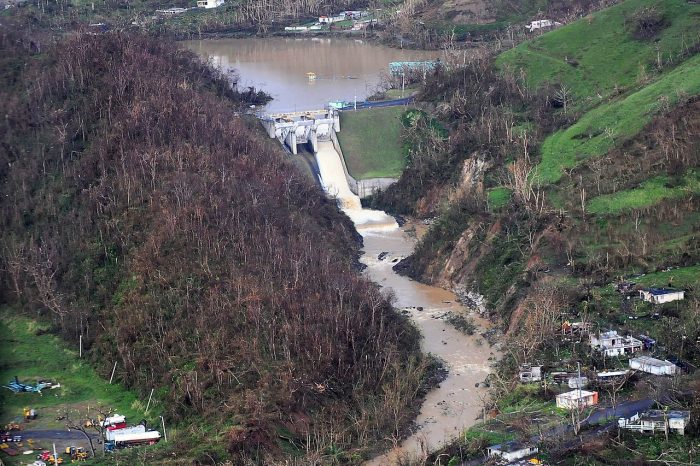For years, professors at the University of Puerto Rico Mayagüez have been leading the way in deliberating and taking action on energy controversies and challenges in Puerto Rico. However, members of the National Institute of Island Energy and Sustainability (Instituto Nacional de Energía y Sostenibilidad Isleña, or INESI) claim they are being excluded from key conversations and decisions about the island’s energy future in this post-Hurricane María period. INESI is directed by an interdisciplinary team of professors, who are committed to creating a sustainable energy ethic to guide deliberation, decision-making, and implementation of community-based renewable energy projects in Puerto Rico.
Last week, INESI members composed letters to Puerto Rican Governor Ricardo Rosselló and Lieutenant General Jeffrey Buchanan, who is leading Puerto Rico’s electric system reconstruction. INESI’s steering committee, Dr. Lionel Orama Exclusa, Dr. Cecilio Ortíz García, and Dr. Marla Pérez Lugo, co-signed the document. In our October 16 phone conversation, Pérez-Lugo expressed that members felt compelled to write the letters, based on the discourses they were hearing about rebuilding, rather than dramatically transforming, the energy grid. She said: “We got worried, as the system as it was is what brought us here.”
In its letter to the governor, INESI members contend: “La sostenibilidad de nuestro sistema eléctrico depende del uso descentralizado de nuestros recursos locales (como la conservación, la eficiencia, los sistemas solares en los techos y almacenamiento en casas y edificios) y de una nueva gobernanza justa, desconcentrada, colaborativa, participativa, y democrática.”/“The sustainability of our electric system depends on the decentralized use of our local natural resources (like conservation, efficiency, solar systems on roofs and placed on houses and buildings) and a new just, deconcentrated, collaborative, participative, and democratic government.”
Following procedures, INESI members visited the University of Puerto’s Central Administration to discuss energy concerns with the interim president, whose office oversees INESI. Members knew that they needed his approval before the letters could be shared with the governor and Buchanan. Pérez-Lugo says she and other members were scolded by university personnel for writing the letters.
Although the president was present, INESI members were told he was unable to see them. Members left their letters at the Central Administration.
Determined to have their concerns heard and letters received, Pérez and colleagues then visited the Center of Emergency Operations in San Juan, which is located at the upscale Puerto Rico Convention Center. INESI members encountered countless police officers and Army personnel, as they tried to gain access to attend First Lady of Puerto Rico Beatriz Areizaga Rosselló’s press conference. The first, second, and third floors of the convention center were reserved for local press, state emergency managers and local press, and FEMA and the Army Corps of Engineers, respectively.
According to INESI members, to reach the first and second first floors, one could take a functioning escalator, despite widespread power outages elsewhere, which has left 90 percent of residents without electricity. A buffet was available, and the building was air conditioned. “It was a complete disconnection between what’s going on in the island and what’s going on there [in the convention center,]” Pérez-Lugo reported.
INESI members also posted an additional letter to the INESI Facebook page on October 10, addressed to both Governor Rosselló and Tesla co-founder and CEO Elon Musk.
The letter urges the governor and Musk to consult them on energy decisions, as the two discuss plans to rebuild Puerto Rico’s energy system. The authors note the substantial resources and insights that the INESI team has accumulated while studying and contributing to energy conversations and decisions in Puerto Rico over the years. They explain: “We stand ready to help… With over 90 contributing faculty covering 23 disciplines, across the 11 campuses of the UPR [University of Puerto Rico], INESI offers unparalleled expertise in the technical, economic, and social dimensions of energy transitions.”
An additional co-signee of the letter is Dr. Clark Miller, associate director of the School for the Future of Innovation in Society at the University of Arizona. To date, INESI members have not been contacted by Rosselló about their offer.
***
Catalina de Onís is an assistant professor in the Department of Civic Communication and Media at Willamette University in Salem, Oregon. She received her PhD in Communication and Culture from Indiana University. Her research and teaching work at the intersection of Latina/o/x studies, (de)/coloniality, race, the environment, energy, and gender. Her current project, Fossil Port: Fueling and Disrupting Energy Coloniality in a US Colony, is derived from her graduate research in Puerto Rico.



